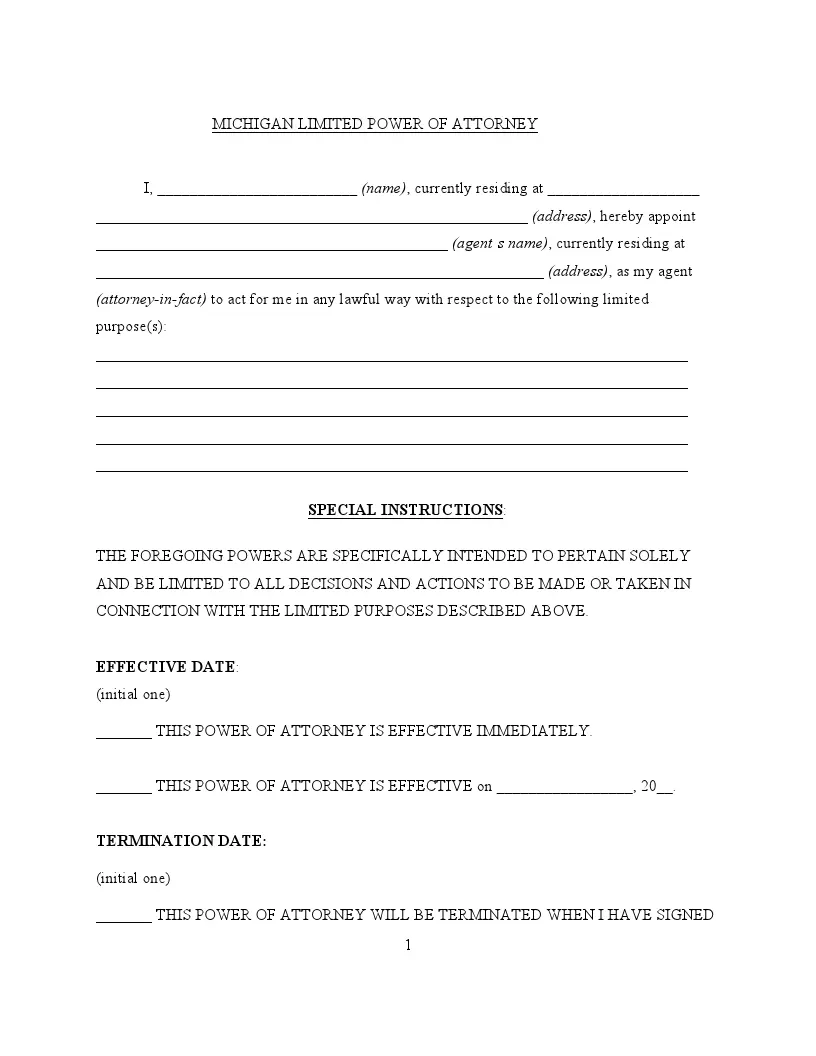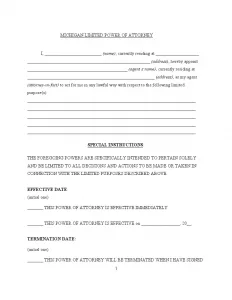Michigan Limited Power of Attorney Form
The Michigan limited power of attorney form is a legal instrument that enables a person (referred to as the “principal”) to appoint someone else (known as the “agent” or “attorney-in-fact”) to carry out designated tasks or manage specific issues for them. This form is differentiated from a general power of attorney by its focus on particular duties and its typically temporary nature.
With limited power of attorney in Michigan, an agent might receive authorization to oversee real estate transactions, including purchasing, selling, or managing properties. Additionally, the agent could handle business operations, like overseeing financial accounts or executing contracts. The form also allows the agent to act in legal capacities, for instance, representing the principal at court hearings where specific permissions are necessary. Furthermore, it can specify permissions to manage certain financial decisions, such as accessing safety deposit boxes.
Using Michigan power of attorney forms for legal transactions can simplify the process and ensure that all actions are properly authorized.

Build Your Document
Answer a few simple questions to make your document in minutes
Save and Print
Save progress and finish on any device, download and print anytime
Sign and Use
Your valid, lawyer-approved document is ready
In Michigan, the execution of a Limited Power of Attorney must adhere to specific legal requirements to ensure its validity, as outlined in the Michigan Compiled Laws, Sections 700.5501 to 700.5505. These statutes provide the framework for how such documents should be signed and witnessed.
The principal must sign the document. This signature must be acknowledged in the presence of two witnesses or a notary public, as specified under Section 700.5501(2). The witnesses must be adults and should not be the designated agent or have any vested interest in the power of attorney document. Essential points for valid signing include:
- The principal’s signature must be voluntary and intentional.
- Witnesses must observe the signing to confirm the principal’s capacity and willingness.
- Alternatively, a notary public can acknowledge the signature, providing an added layer of verification.
These steps are crucial for the power of attorney to be legally binding in Michigan. They prevent potential fraud and ensure the document reflects the principal’s true intentions.
Michigan Limited Power of Attorney Form Details
| Document Name | Michigan Limited Power of Attorney Form |
| Other Name | Michigan Special Power of Attorney |
| Relevant Laws | Michigan Compiled Laws, Sections 700.5501 to 700.5505 |
| Avg. Time to Fill Out | 8 minutes |
| # of Fillable Fields | 32 |
| Available Formats | Adobe PDF |
Filling Out Michigan Limited POA
When you need someone to act on your behalf for specific tasks in Michigan, a limited power of attorney form can be used. Filling out this form accurately ensures it meets all legal requirements and effectively communicates your intentions.
1. Enter Principal’s Details
Fill in your full name and current residence at the top of the form. Ensure that the information is accurate and corresponds to your legal identification to avoid any validity issues with the document.
2. Designate Your Agent
Identify the person you are appointing as your agent by entering their full name and address under the section that begins with “hereby appoint (agent’s name), currently residing at (address).” Choose someone trustworthy, as they will be acting on your behalf.
3. Specify Powers Granted
Clearly describe the powers you delegate to your agent in the space provided. Be as specific as possible about the tasks you want your agent to perform. This will strictly limit the agent’s authority to the tasks listed.
4. Set the Effective Date
Choose when the powers will become effective. If the form is to take effect immediately, initial the corresponding option. If it should start on a specific future date, provide that date and initial beside the correct choice.
5. Determine the Termination Date
Decide when the power of attorney will end. This could be after a specific event, a set date, or upon your incapacity as defined by Michigan law. Initial next to the choice that best suits your needs.
6. Appoint a Successor Agent
If you wish to appoint a successor agent in case the primary agent can no longer serve, fill in the name and address of the alternate agent under “Successor Attorney-in-Fact.”
7. Principal’s Signature
Sign the document on the designated line and write the date to validate the form. Two witnesses or a notary public must observe this action to comply with Michigan law.
8. Witness and Notarization
Have the form witnessed by two individuals not named as agents in the document. Alternatively, you can have it notarized by a notary public. This step is essential for the legal standing of the document.
